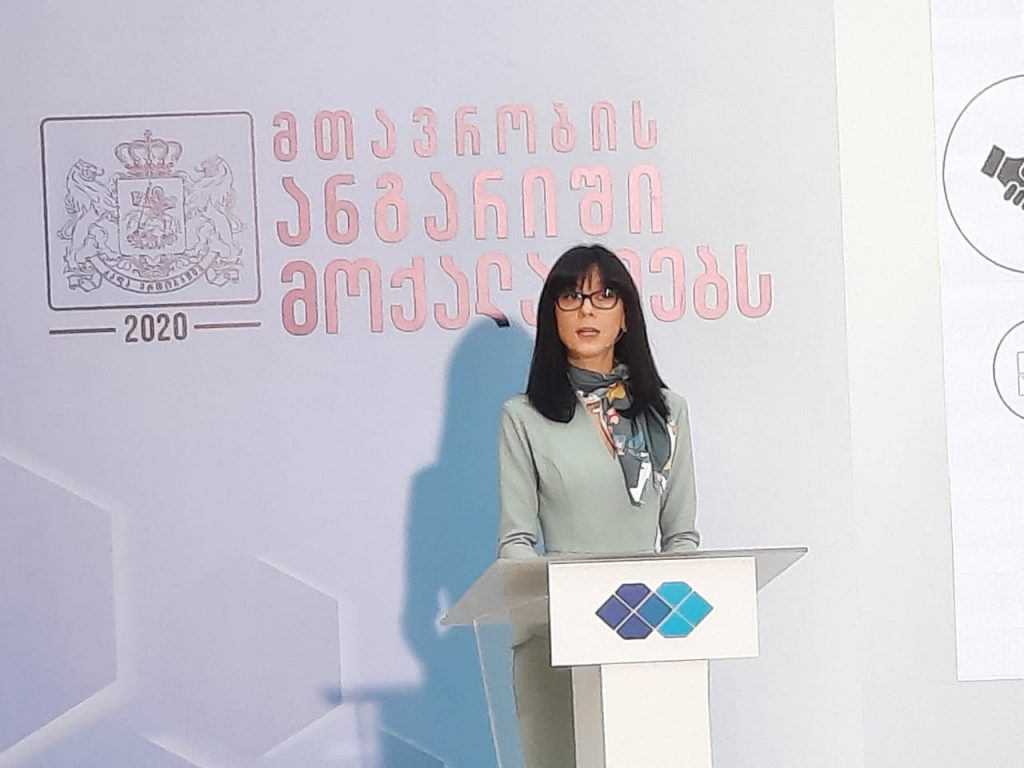State Minister for Reconciliation and Civic Equality Tea Akhvlediani, overseeing the occupied regions of Abkhazia and Tskhinvali / South Ossetia presented on December 30 an annual report about the activities carried out by the Minister’s office in 2020.
The Minister stressed the critical state of the human rights and socio-economic conditions of residents in both Abkhazia and Tskhinvali regions, further aggravated during the pandemics. Minister Akhvlediani also spoke of ethnic discrimination of Georgians in the two regions and unprecedented restriction of freedom of movement that isolated the population and created a humanitarian crisis, particularly in Tskhinvali-held Akhalgori district.
She noted continued “borderization” activities and detentions along the dividing lines, and recalled that Georgian citizens Irakli Bebua, Zaza Gakheladze and Genadi Bestaev remain in occupied regions’ custody. The Minister added that Russia’s moves eyeing annexation of the regions further hamper reconciliation and efforts to develop ties with residents across the dividing lines.
Peace and Humanitarian Initiatives
Speaking of humanitarian, peace and confidence-building measures implemented in 2020, the Minister focused on the international-financed new “Peace fund for a better future” mechanism, that provided funding for 14 business projects, aiming to foster trade and economic relations among the conflict-divided communities.
The Minister reported that through a status-neutral coordination mechanism, the aid worth of GEL 4 million (USD 1,22 mln) has been provided by international partners to Abkhazia, adding that international partners, upon Tbilisi’s consent, also launched 36 new confidence-building projects.
The Reconciliation Minister also reiterated the readiness to expand informal dialogue and cooperation with the Abkhaz and Ossetian communities, based on “common interests,” to discuss various humanitarian and human rights issues “through depoliticized approaches.” Underscoring recent success stories of such informal communications with the Abkhaz community, she said it enabled the organized transfer of hundreds of school and university students to continue their studies on Georgia proper.
According to the report, the number of students from occupied regions enrolling at Georgian higher education institutions – financed through undergraduate scholarship programs – tripled, reaching 400 in 2020.
The Minister’s report also included projects aimed at improving conditions for people living in areas adjacent to the occupation line, including through major infrastructure, utility and educational projects, as well as social campaign projects directed at socially vulnerable groups in all Tbilisi-controlled 116 conflict-affected villages.
Medical Assistance
The Minister also spoke of the COVID-19 assistance provided to the residents of the two regions, including preparing pandemic-related information in Abkhaz and Ossetian languages, sharing medical expertise through online consultations and visits of WHO experts in Abkhazia, delivering medical supplies by Georgian authorities and international partners, and transferring patients to Georgia proper for medical treatment.
Tbilisi has so far received 250 COVID-19-infected patients from Abkhazia, the Minister said, adding that similar assistance cannot be provided to the Tskhinvali region “due to the destructive approach on part of the occupation regime.”
The residents of the occupied regions also continue benefiting from the general free healthcare program on Georgia proper, and up to 900 patients from these regions have availed to this program this year, the report said.
This post is also available in: ქართული (Georgian) Русский (Russian)

